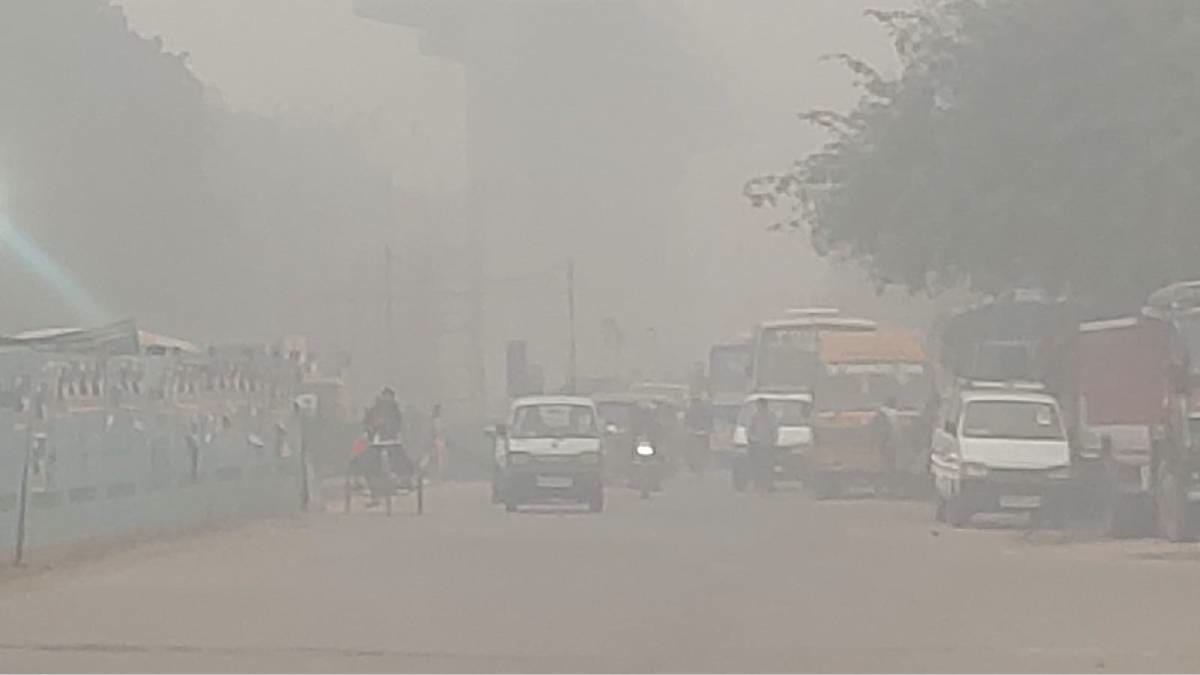New Delhi: With a yellow alert sounded by the meteorological department on Monday, Delhi braces for more pollution-induced problems. The AQI was recorded at 484 in the morning and 500 in the evening in five areas while beyond 480 in the rest. A yellow alert is issued when moderate to dense fog prevails at dawn and dusk. The weather was relatively colder on Sunday with the drop of the mercury to 27.2 degrees Celsius, the season's lowest. The increasing pollution has reduced visibility in many pockets of the city.
Toxic foams were seen floating in the Kalindi Kunj section of the Yamuna, as residents complained of difficulty in breathing and burning sensations in the eyes. "I have been living here for 20 years...it (air pollution) irritates the eyes, difficulty in breathing along with cough and cold. Pollution is very high here. Water is also polluted...we have become accustomed to it now. But a new person will not be able to live here as he will fall sick immediately," a resident said.
The persistent smog affected train movements. Delhi International Airport Limited (DIAL) issued a notice saying, "Low visibility procedures are underway at Delhi Airport. All flight operations are currently normal. Passengers are requested to contact the respective airlines for updated flight information".
A thick layer of smog loomed over the Taj Mahal amid rising air pollution levels in Agra. According to the Central Pollution Control Board (CPCB), the air quality in Agra remained in the 'poor' category. Delhi chief minister Atishi on Sunday announced that physical classes will be suspended for all students except Class 10 and 12. The announcement came soon after the Graded Response Action Plan (GRAP)-IV came into effect in Delhi-NCR on Monday.
In a post on X, Atishi wrote, "With the implementation of GRAP-IV from tomorrow, physical classes will be closed for all students except Class 10 and 12. All schools will conduct online classes till further orders".
This is in addition to the preventive actions mentioned under Phase I, Phase II and Phase III of GRAP already in place. The GRAP for the National Capital Region (NCR) categorises Delhi under four different phases of adverse air quality: Phase I- poor category (201 to 300); Phase II -very poor category (301-400), Phase III - Severe category (401-450), and Phase IV - Severe Plus category (>450). The Phase-IV response includes an eight-point action plan designed to mitigate the pollution crisis. Key measures include a ban on the entry of non-essential truck traffic into Delhi, except for trucks carrying essential goods or providing essential services.
LNG/CNG/electric and BS-VI diesel trucks will still be allowed. Light commercial vehicles (LCVs) registered outside Delhi will also be allowed to ply. Medium and heavy goods vehicles running on BS-IV and below diesel registered in Delhi will be prohibited from plying, except for essential vehicles. The sub-committee has also extended the ban on construction and demolition activities of public infrastructure projects such as highways, roads, flyovers and power transmission lines.
State governments and the Delhi government (GNCTD) have been advised to consider shifting physical classes to online mode for students of Classes VI-IX and XI and capping office attendance to 50 per cent, while the rest should work from home. Similar work-from-home arrangements can also be considered for central government employees.
State governments have been urged to consider emergency measures such as closing colleges and non-essential commercial activities and implementing the odd-even policy for vehicles. CAQM has called upon citizens to cooperate with these measures and stay indoors as much as possible especially vulnerable groups such as children, the elderly and people with respiratory or cardiac diseases. CAQM stressed that it is closely monitoring the air quality and will review the situation regularly to assess further action.
Also Read:



